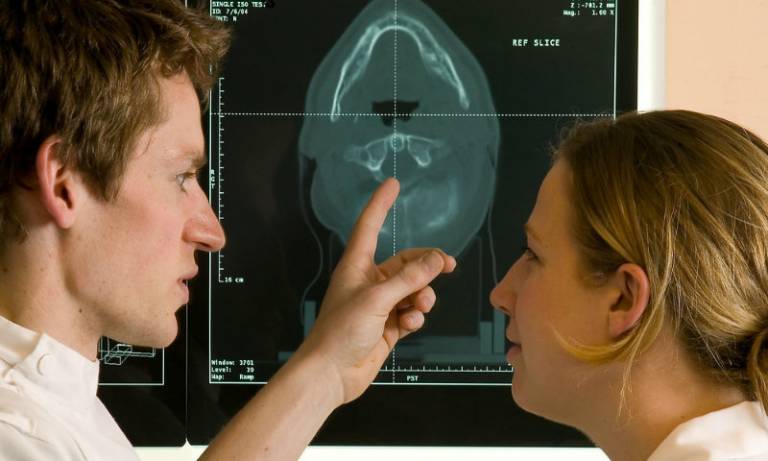Learning through observation: why work shadowing works
Dr Sumanjit Gill (UCL Institute of Neurology) explains how MSc Stroke students take part in work shadowing, giving them exposure to industry and a chance to build specialist knowledge.

28 April 2017
Students on the Stroke MSc programme can undertake clinical observership placements, or work shadowing, on the Hyperacute Stroke Unit at University College London Hospital and within stroke clinics at the National Hospital for Neurology and Neurosurgery.
The initiative was developed in the UCL Stroke MSc with Professor Werring and Dr Robert Simister.
An opportunity to see theory translated into practise
Observing practice helps students to see how evidence-based stroke treatment is translated through to implementation in a clinical environment and how services are organised.
It also provides them with a chance to see a variety of professional roles in action and the opportunity to see how randomised controlled trials are carried out.
Students gain insights into the challenges and themes that are key to the clinical system and develop their understanding of the structure of the stroke research network.
Using reflection to assess placements
To consolidate their learning, students then participate in a reflective session where they consider what they have gained from the placement and how this might shape their future professional identity in addition to guiding their learning.
Students are encouraged to think about how they would feel working in that environment and what specific professional challenges they might face.
These ideas and experiences are then expressed in the form of various outputs, for example in the form of oral presentations to peers and writing for stroke patient information newsletters.
Developed in response to student feedback on employability
Now in its second year, the UCL Stroke MSc programme was originally developed to meet the need of a growing multi-disciplinary medical specialty with huge possibilities for novel therapies arising from the research done in this area. It has attracted students from different professional backgrounds and across the world and continues to be the only face to face taught MSc in Stroke Medicine globally.
This approach came about when students in the first year of the programme flagged the importance of developing employability throughout their studies and expressed concerns that they could not relate the theory and science they were being taught in lectures to the workplace.
These observations, framed by briefing, reflective sessions and with the production of either a piece of work or new learning outcomes, were intended to help meet that need. This approach reflects both the ethos of the UCL Connected Curriculum and the theories underpinning how students learning in work place settings.
Embedding work shadowing into the programme
The challenge of organising work-shadowing for the growing number of students, outside of the classical taught curriculum, will be made easier next year by being timetabled into the programme and being linked to assessments. It will also help staff and students to manage their time and studies by knowing that the placements are a fully supported part of the programme.
In addition, the administrative process for obtaining observership contracts is being streamlined.
There will also be a continuing focus on greater support for international students, who are entering a new professional, cultural and linguistic environment. The aim is to help students to start thinking about their leap into the workplace earlier in the programme and to feel more confident when making choices about what the next step might be.
Student feedback has been positive, with many saying that they benefited greatly by working directly with leaders in the field and listening to patient narratives regarding their stroke.
One student commented: “The opportunity to work and learn from clinicians and healthcare professionals from different clinical backgrounds was a unique learning experience.”
 Close
Close

